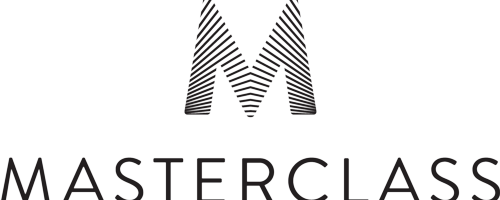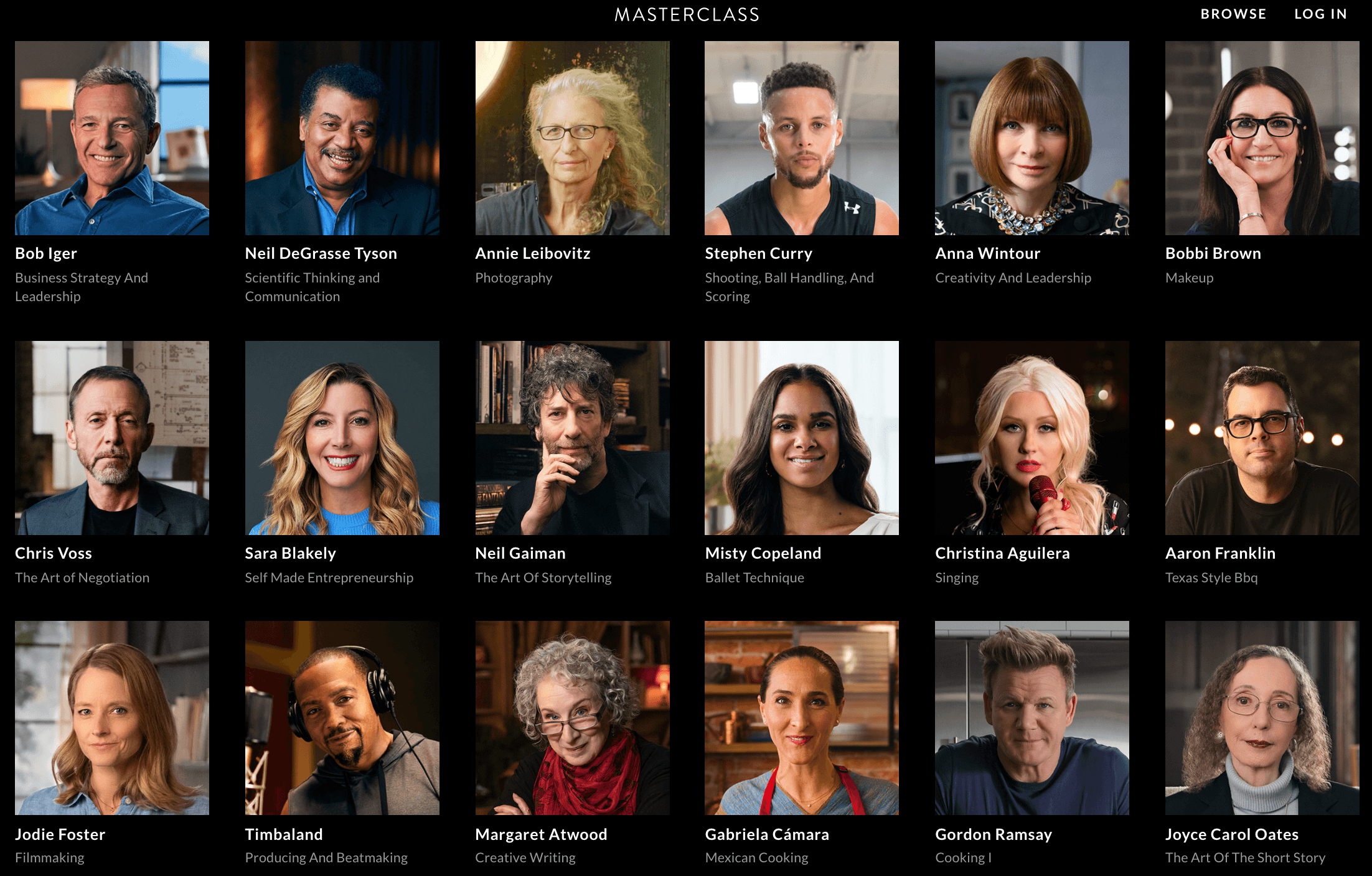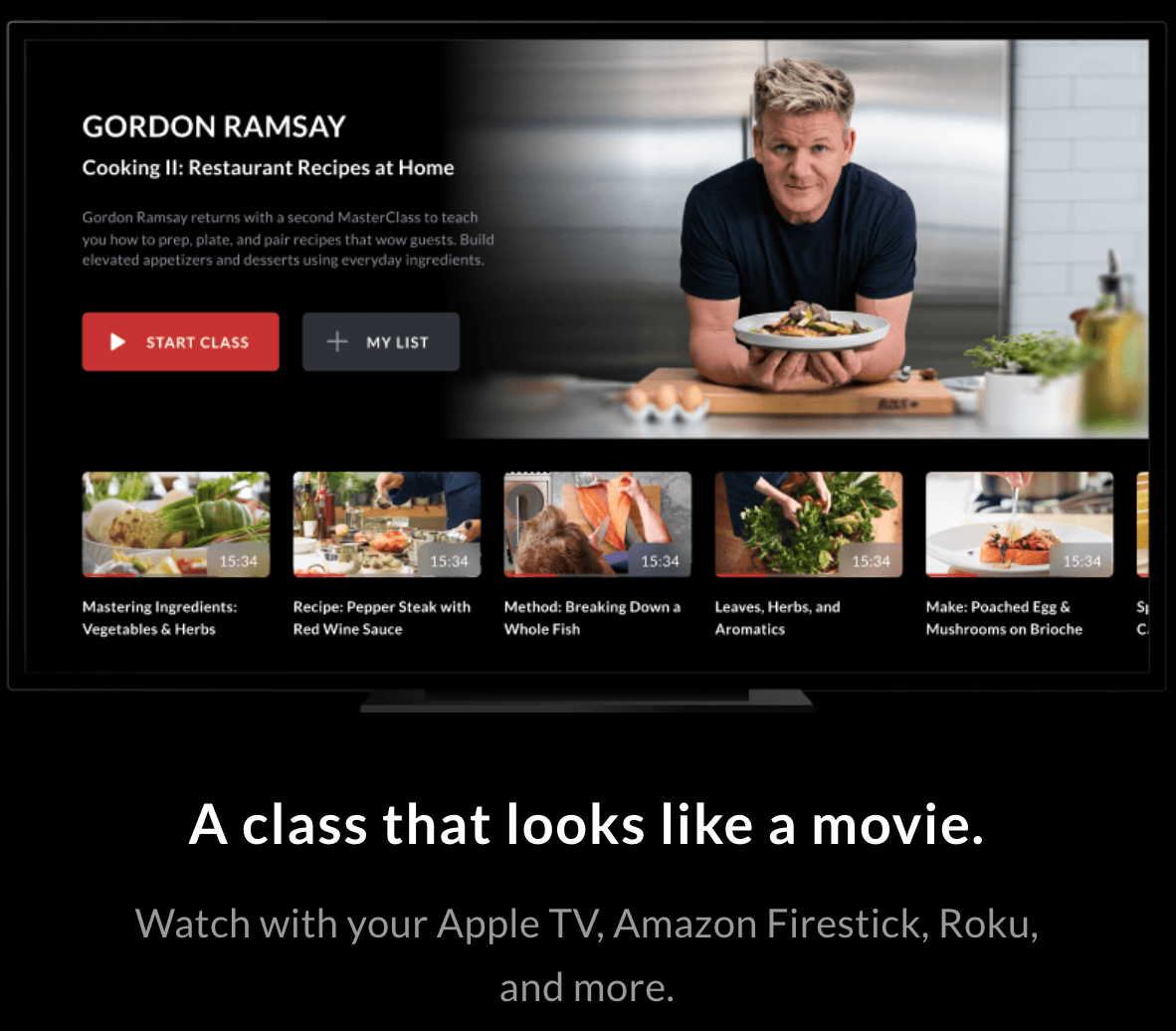MasterClass: The future of “edutainment”

Bored at home? Here’s how to invest in yourself while staying entertained in the time of coronavirus.
Overview
MasterClass is an original content producer and streaming platform that provides online courses led by celebrities in a variety of fields. Courses each contain between 20 – 30 video lessons that are around 10 – 20 minutes long, and are produced to Hollywood-level video production quality. There are currently 83 courses on the platform, with names ranging from “Malcolm Gladwell Teaches Writing” to “Serena Williams Teaches Tennis”, across 9 different categories ranging from “Music & Entertainment” to “Design, Photography & Fashion” to “Business, Politics & Society.” Most lessons are structured as intimate, one-on-one conversations with celebrities who share insights into their craft, while other lessons (such as cooking or various sports) involve demonstrations. Most courses are accompanied by a downloadable workbook (a pdf that contains lesson takeaways and homework assignments) and a community section allowing users to engage through reviews, questions and comments.

MasterClass is available across all mobile and desktop platforms, as well as through AppleTV, Roku, and the Amazon and Google Play app stores. It has options for audio only and is downloadable to local devices. The price is currently $180 for a full year subscription with unlimited access. During the COVID-19 pandemic, MasterClass has been offering a discounted price of $180 for 2 annual memberships.
To date, MasterClass has raised $136 million, with its most recent $80 million Series D funding raised in 2018. The company stated in 2018 that its revenues were just shy of the leading competitors, Udacity and Coursera, which are estimated to be in the $70 – $100 million range.
Value Creation & Differentiation
MasterClass has successfully differentiated itself from competitors offering MOOCs (massive open online courses), who have traditionally struggled to find sustainable growth and value capture. Unlike competitors, MasterClass has doubled down on creating exclusive original content, executed with high production quality and celebrity instructors, which gives the platform a huge competitive edge. Big names allow for the courses to have longer shelf-life and to build the brand of the MasterClass platform itself. MasterClass recognized early on that the traditional classroom model does not necessarily translate well into online, and created a digital product that is on par with entertainment and is offered through the same channels as entertainment (such as smart TVs). By pricing with an annual subscription fee rather than a price per course (or certificate), it is distancing itself from MOOCs and aligning itself with Netflix and other SVOD models. In order to showcase the quality of its courses and to entice consumers to purchase, users can browse all courses without a membership, and watch freely accessible trailers and sample lessons.
MasterClass has also capitalized on the versatility of its digitally native platform to increase engagement. Given shorter attention spans in media consumption, MasterClass has extracted short clips, called “Snapshots,” of between 2 – 4 minutes from its library and offered these on a standalone basis. Another offering, called “The Short Cut”, gives users standalone videos of between 15 – 20 minutes each that aggregate and compress the highlights of a full-length course (typically 20 – 30 lessons long). Finally, another method that MasterClass is using to increase engagement across subject matters is creating “playlists” that bundle individual lessons from diverse instructors together. Examples of playlists include “Leadership,” which contains 5 videos from Shonda Rhimes, Werner Herzog, Martin Scorsese, Hans Zimmer, and Chris Hadfield, and “Eggs,” which contain videos from Thomas Keller, Gordon Ramsay, and Alice Waters.
Though MasterClass is not a two-sided platform strictly defined, it benefits from some of the forces that have helped platforms. MasterClass collects copious consumer data, through tracking consumer engagement with the various videos on the platform as well as surveys that ask users questions upon entering the course (such as NPS). It then uses the data to personalize suggestions for each user on the home page, including further video, course and playlist suggestions. This use of aggregated data and personalization increases same-side network effects, where more users and more data drive a more valuable product. Additionally, cross-side network effects are also present — the more users, the more celebrities will sign up to produce courses on MasterClass (and potentially at lower fees); the more celebrity courses, the more users will join. The risk of multi-homing and disintermediation are low, as there are few alternatives for users and for instructors, and few incentives for instructors to create their own high-quality online courses. The risk of local network clustering is not a factor here, which makes MasterClass especially successful during the COVID-19 pandemic.
Sustaining growth into the future
The COVID-19 pandemic has benefitted streaming platforms across the board as users rely more heavily on digital forms of engagement and entertainment. MasterClass has done a masterful job of capitalizing on this opportunity with its promotion of 2-for-1 annual subscriptions that incentivize sharing and word-of-mouth customer acquisition (as well as heavy paid social media advertising). It’s likely that after significant chunks of the population return to work, users will reduce their engagement with the platform and perhaps ultimately elect to non-renew their subscriptions. Especially given the increasing number of subscription services becoming available, consumers may choose to rationalize their “portfolios” and reduce costs and consumption based on salient preferences. The challenge is for MasterClass to keep up user engagement with the platform and more importantly, subscription additions and renewals, while reducing the cost of customer acquisition.
There are a number of ways MasterClass can achieve this. Firstly, MasterClass has intentionally made the decision to pursue a “widening” of the curriculum to include diverse fields rather than “deepening” it, such as through adding on advanced levels of the same course for more advanced learners. One method of holding onto users in the medium-term is to start incorporating more advanced courses. Secondly, MasterClass currently does not purport to offer rigorous training programs in a particular craft; its videos are more akin to a collection of insider tips and reflections from the best of the best. This model is more similar to entertainment than education, and competes with the likes of podcasts and other forms of media. In order to sustain this model, MasterClass needs to consistently add to its content library to ensure that even old subscribers are getting new value. Thirdly, MasterClass needs to find ways of making its courses more interactive. The community section on MasterClass feels generic rather than personalized; celebrity instructors only occasionally interact with students. Increasing the number of live-stream webinars with teachers, and perhaps more directly integrating social media are two potential ideas to increase interaction between student and instructor. Fourthly, MasterClass needs to continue broadening the diversity of instructors represented on its platform. As of its 2018 Series D raise, the platform had roughly 75% male instructors and 80% were white. The numbers are roughly the same today.
One of the impacts that the COVID-19 pandemic is likely to have is a sea change in the way that education is delivered in the future. With many educational institutions forced to provide at least some portion of their instruction through digital channels, both students and institutions may now see the possibilities of virtual education in a more positive light. Physical proximity, hands-on experience, and social engagement offered through current education models will be more seriously weighed against the benefits of personalization, flexibility, ease of access, and, as technology improves, the delivery of higher quality products through massively scalable digital channels. MasterClass should evaluate whether there is a role for more “formal” mainstream education through its platforms. (In fact, MasterClass co-founder and CEO Aaron Rasmussen has launched another startup, Outliers.org, that has partnered with the University of Pittsburgh to provide similarly high-quality digital courses for college credit — starting with two classes, Calculus I and Introduction to Psychology, for $400 per course. This is compared to an average cost of $2500 / course for a student to attend a generally crowded intro course on a college campus.) Quality education at a lower price delivered through scalable digital platforms is an attractive proposition that will likely shake up the model of education at all levels in the future. To sustain itself in the long-run, MasterClass should continually sow the seeds of investment in new experiments both on a direct-to-consumer level and through partnerships with traditional institutions and stakeholders (public & private) in order to capitalize on value creation and capture wherever it may occur.
References:
- https://techcrunch.com/2018/09/11/masterclass-is-mastering-scale-as-a-media-business/
- https://venturebeat.com/2018/09/06/masterclass-raises-80-million-to-bring-celebrity-mentors-to-the-masses/
- https://www.vox.com/the-goods/2019/1/16/18177077/masterclass-subscription-video-serena-williams-how-to-famous
- https://melmagazine.com/en-us/story/the-masters-behind-masterclass
- https://www.businessinsider.com/masterclass-review
- https://techcrunch.com/2018/10/03/masterclass-new-offerings/
- https://techcrunch.com/2018/09/06/masterclass-raises-80m-after-doubling-sales-last-year/
- https://www.edsurge.com/news/2017-03-28-masterclass-raises-35m-to-expand-celebrity-led-courses
- https://thehustle.co/masterclass-raises-80-million-series-d/
- https://techcrunch.com/2020/01/09/masterclass-co-founders-new-educational-startup-outlier-raises-11-7m/
- https://gizmodo.com/masterclass-founder-launching-online-college-credit-cou-1837203429




Didn’t know how Masterclass really operated, and that it is positioning itself against Netflix or Coursera. Very interesting business model. I was curious about the legitimacy of these courses given it proposes to “teach” people something. Is it just for leisure, or can it try to follow a Coursera model of awarding certificates and then linking it to the employment market? Given it is not going “deep” but “wide”, wondering if its sole strategy to get as many eyeballs may result in fewer renewals.
Interesting article. I visited Masterclass this January as part of Westrek, and have since been a customer. They actually started by charging per course and only switched rather recently after extensive LTV-focused A/B testing.
I think the biggest part of the value proposition is not celebrities, but that both a celebrity brand and the Masterclass brand are vouching for the quality and curation of the content. I’m sure for all topics, similarly high quality content could be found on YouTube, but because it’s mixed in with all the clickbait chunk, without a way to filter for quality, it’s too much of a pain to find.
Thanks for sharing – Masterclass is indeed a very interesting business combining elements of entertainment with actual learning. However, I do think the business will struggle in the long-run, because of several reasons:
1) Revenue share agreements with celebrities are expensive
2) Customer acquisition is high and churn rate is high
3) Willingness to pay for “edutainment” is not clear – as it’s neither a true entertainment spent nor a valuable degree
I think customers would consider masterclass a truly “discretionary spend” – people do these programs more for fun than for Return on Investment. Therefore, a recession will hit Masterclass much harder than Coursera or other education companies that help students not only upskill themselves but also gain advancements in their careers.
Great Post! I really enjoyed. I agree that the celebrities lectures are great and work as an introductory course in some interesting fields. As you correctly pointed, the short videos match the short attention spam we increasingly have. Offering more advanced courses will be a key step going forward and I am curious to know how they would do that. Interaction with celebrities is also something not easy to do, maybe the company could offer to subscribers some special treatment in the celebrities social media for instance, as a VIP access in the same channel they interact with millions of users.